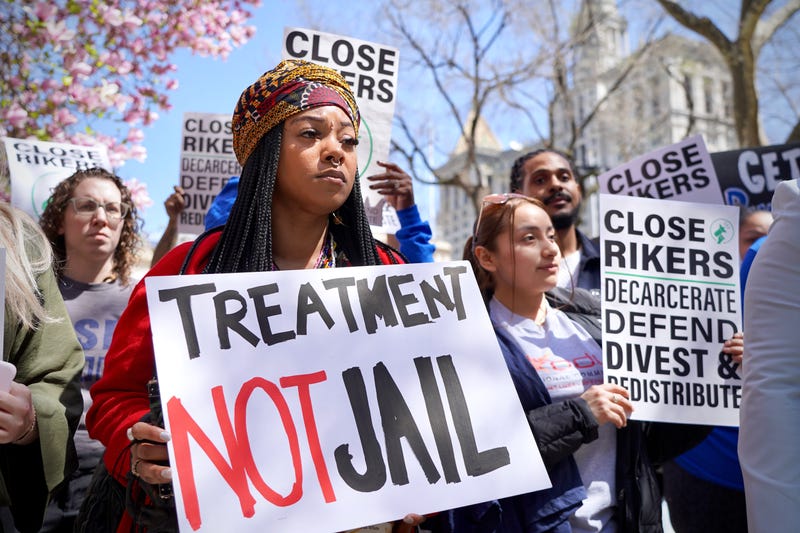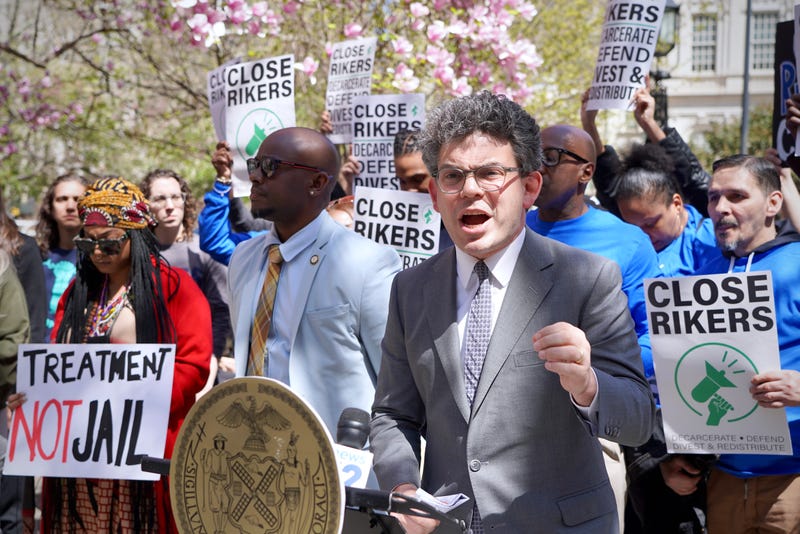
NEW YORK (1010 WINS) — City Council members on Tuesday introduced a slate of proposals aimed at reducing the number of people incarcerated on Rikers Island with the end goal of closing the notorious prison.
In 2019, the Council voted to close Rikers by Aug. 31, 2027, but Mayor Eric Adams has not yet put forward a plan for reaching that goal.
"The law currently says Rikers must close and we follow the law," Adams told 1010 WINS. "The question of the jail population being larger than the Borough Based Jails plan is the elephant in the room when discussing this and I’m not going to shy away from talking about the challenges and the reality that we face."
Council members Lincoln Restler. Kevin Riley and Carlina Rivera authored a $300 million proposal that would attempt to bring the population at Rikers from almost 6,000 to under 3,600 — enough that the remaining inmates could be moved to four jails being built to replace Rikers.
The New York City Comptroller’s Office found it costs about $556,000 every year to house a single detainee. If the plan is successful, it would save the city money despite the hefty up-front cost by reducing the number of prisoners being held using taxpayer money.
Department of Correction Commissioner Louis Molina told the Council he anticipates the population at Rikers will rise to 7,000 over the next two years based on current trends.
The decision to close the prison was made amid a humanitarian crisis on the island. Reports from a federally appointed monitor have found violence at the prison goes unchecked, staff lavish in chronic absenteeism and the DOC fails to provide basic services to detainees.
Over the past two years, 36 people have died at Rikers. About half of all detainees have been diagnosed with mental illness. About 90% of detainees are awaiting trial. The average wait time for people held on pretrial detention at Rikers is about 280 days.
“For decades, Rikers Island has been an inhumane jail complex that exposes vulnerable New Yorkers to trauma and instability and leaves people in worse condition than when they entered,” said Restler.

The plan proposed Tuesday includes funding for support programs designed to reduce recidivism, a population review team that would determine which inmates are eligible for release and measures to expedite trials.
If passed, the following are some of the programs that would see multi-million-dollar investments:
-$28 million for the city’s supervised release program toward a more intensive model that connects formerly incarcerated people to mental health and substance use resources.
-$34 million for Alternative to Incarceration Alternative to Detention programs that seek psychological treatment in place of incarceration.
-$45 million for the NYC 15/15 supportive housing program.
-$26 million for Justice Involved Supportive Housing, a program that provides housing for formerly incarcerated people. The price tag would buy an additional 380 beds for a total of 500.
-$46 million for Rapid Reentry Housing, a program that provides temporary housing to former Rikers detainees through hotel contracts with onsite services.
-$135 million for the city’s indigent defense legal services.
Also listed in the plan are programs to accelerate the construction of therapeutic hospital beds, the expansion of an early release program introduced at the start of the pandemic and funding for paralegals to speed up trials.
“Streamlined case processing is just one way we can reduce unnecessary, even harmful jail time, imposed on New Yorkers,” said Rivera, who chairs the Council’s Criminal Justice Committee. “I will continue to advocate for necessary actions, including but not limited to reducing the incarcerated population, recalibrating the Department’s budget, rightsizing Correction staff, investing in services and programs that build safe communities, and centering humanity.”
The mayor said his administration is "exploring all options" and referenced some of the goals of the plan introduced Tuesday without committing to any of the means of achieving them.
"We are exploring all options that will allow us to keep our streets safe and follow the law: everything from urging the state for more funding for mental health services so people don’t end up on Rikers, to additional space, to ways we can keep the courts moving and functioning properly," he said.
Council Speaker Adrienne Adams threw her support behind the plan.
“The path forward is continuing towards the closure of Rikers by 2027, and investing in our communities and programs that create and sustain a safer city,” she said. “This is the only plan that serves our city.”



